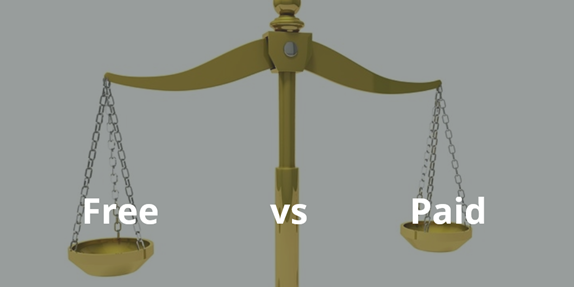Free email vs Paid email
Since I started my own company I am more aware of the impact of a domain name for your company. Not only for your website but also for your email address. I keep seeing companies with their own domain and website but having an @outlook.com or @gmail.com email address. That inspired me to write this post.

Free email
So let’s start with what I mean by free email. These are the providers where you just can register and get an email address for ‘free’. Almost nothing is for free on the internet, you pay it one way or another. For instance, using gmail.com means that Google can look at your email and target advertisements to you based on the emails you send and receive. Not that much wrong with that if you are a private person. Other providers make their money on similar ways.
Paid email
These are the providers where you pay some amount of money to host your email, usually you get this with your hosting provider or you can go with another party to host it like Office 365, Gmail for Business.
Branding
The most important part of your company is how your customers can reach you, this can be done by visiting your website, send an email or by phone. My feeling with a company that uses a free email address gives themselves not enough credit for how they brand themselves to the outside world. When I can choose between two small businesses that have similar qualifications and one has a paid email address and the other a free one, I will choose for the paid one because they probably have a better value of themselves.
Privacy
When you use a free email provider, privacy is usually the first one that will be sacrificed. Most users do not know this because they do not read the agreements before signing up for the account. To know what you are giving to the provider you can read the license agreement or you can take a good guess on how the company is making their money. For Google, this is advertisements. For Microsoft, this is selling licenses and products.
Costs
The costs of an email address can be just hard cash or with your privacy. When you choose for a paid email provider the cost can be from a few Euro’s/Dollars per month to around 10 Euro’s/Dollars depending on the provider or options of the email provider. Most domain providers also give you access to basic email facilities. My domain provider has a website package with 5 email addresses for €5, - per month. But you can also choose to host it on Office 365 and there you have and Office 365 Exchange Plan 1 for €3,40 per month. A basic Gmail for business costs $5, - per month.
Accessibility
Nowadays we have at least 2 devices if not more where we check our email on. This can give some challenges with some of the hosting companies because they have their own system and synching that to your phone, tablet and computer can sometimes a challenging task. When you use Office 365, Gmail for business, Outllook.com or Gmail this is as simple as entering your email address and password on those devices. Some have their own apps like the Outlook app
Compatibility
Not everybody thinks about this one, because email is email, right? Well the email part is not the problem here, but when you run a business you also make appointments and invite other people for those appointments. When you are on Gmail and invite a partner that is not on Gmail they get a strangely formatted email with an extra attachment. When you do the same from Office 365 or outlook it uses the de facto standard ICS format. Using your providers email, you might not have an option to send an invite to other people.
Conclusion
Selecting your email provider is not as easy as it might see. The choice between free and paid is very easy in my opinion. Branding is very important for every company and having your own domain in your email address is a part of this branding, just like your business card and logo is. The selection on which email provider is a harder one for most of you. I really like the service from Microsoft and choose for Office 365. This is compatible with every device and uses the de facto standards in email and appointments.